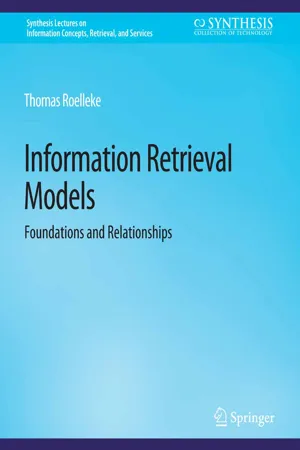
- English
- PDF
- Available on iOS & Android
eBook - PDF
About this book
Information Retrieval (IR) models are a core component of IR research and IR systems. The past decade brought a consolidation of the family of IR models, which by 2000 consisted of relatively isolated views on TF-IDF (Term-Frequency times Inverse-Document-Frequency) as the weighting scheme in the vector-space model (VSM), the probabilistic relevance framework (PRF), the binary independence retrieval (BIR) model, BM25 (Best-Match Version 25, the main instantiation of the PRF/BIR), and language modelling (LM). Also, the early 2000s saw the arrival of divergence from randomness (DFR). Regarding intuition and simplicity, though LM is clear from a probabilistic point of view, several people stated: "It is easy to understand TF-IDF and BM25. For LM, however, we understand the math, but we do not fully understand why it works." This book takes a horizontal approach gathering the foundations of TF-IDF, PRF, BIR, Poisson, BM25, LM, probabilistic inference networks (PIN's), and divergence-basedmodels. The aim is to create a consolidated and balanced view on the main models. A particular focus of this book is on the "relationships between models." This includes an overview over the main frameworks (PRF, logical IR, VSM, generalized VSM) and a pairing of TF-IDF with other models. It becomes evident that TF-IDF and LM measure the same, namely the dependence (overlap) between document and query. The Poisson probability helps to establish probabilistic, non-heuristic roots for TF-IDF, and the Poisson parameter, average term frequency, is a binding link between several retrieval models and model parameters. Table of Contents: List of Figures / Preface / Acknowledgments / Introduction / Foundations of IR Models / Relationships Between IR Models / Summary & Research Outlook / Bibliography / Author's Biography / Index
Tools to learn more effectively

Saving Books

Keyword Search

Annotating Text

Listen to it instead
Information
Table of contents
- Cover
- Copyright Page
- Title Page
- Contents
- List of Figures
- Preface
- Acknowledgments
- Introduction
- Foundations of IR Models
- Relationships Between IR Models
- Summary & Research Outlook
- Bibliography
- Author's Biography
- Index
Frequently asked questions
Yes, you can cancel anytime from the Subscription tab in your account settings on the Perlego website. Your subscription will stay active until the end of your current billing period. Learn how to cancel your subscription
No, books cannot be downloaded as external files, such as PDFs, for use outside of Perlego. However, you can download books within the Perlego app for offline reading on mobile or tablet. Learn how to download books offline
Perlego offers two plans: Essential and Complete
- Essential is ideal for learners and professionals who enjoy exploring a wide range of subjects. Access the Essential Library with 800,000+ trusted titles and best-sellers across business, personal growth, and the humanities. Includes unlimited reading time and Standard Read Aloud voice.
- Complete: Perfect for advanced learners and researchers needing full, unrestricted access. Unlock 1.4M+ books across hundreds of subjects, including academic and specialized titles. The Complete Plan also includes advanced features like Premium Read Aloud and Research Assistant.
We are an online textbook subscription service, where you can get access to an entire online library for less than the price of a single book per month. With over 1 million books across 990+ topics, we’ve got you covered! Learn about our mission
Look out for the read-aloud symbol on your next book to see if you can listen to it. The read-aloud tool reads text aloud for you, highlighting the text as it is being read. You can pause it, speed it up and slow it down. Learn more about Read Aloud
Yes! You can use the Perlego app on both iOS and Android devices to read anytime, anywhere — even offline. Perfect for commutes or when you’re on the go.
Please note we cannot support devices running on iOS 13 and Android 7 or earlier. Learn more about using the app
Please note we cannot support devices running on iOS 13 and Android 7 or earlier. Learn more about using the app
Yes, you can access Information Retrieval Models by Thomas Roelleke in PDF and/or ePUB format, as well as other popular books in Computer Science & Computer Networking. We have over one million books available in our catalogue for you to explore.